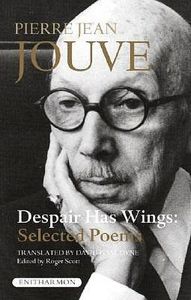Prose & Poetry - Pierre Jean Jouve
Updated - Saturday, 13 December, 2003
Pierre Jean Jouve (1887-1976) retains today in France an exceptional reputation as one of the twentieth century's premier poets.
Nonetheless, the more than three volumes of poetry and the many articles he wrote against the war in the period 1914-1919 remain shrouded by the poet's disavowal of all of his works written before 1925.
In 1921 Jouve had changed the direction of his life, abruptly divorcing his first wife, Andrée, a noted pacifist, and separating himself from their mutual friends including Romain Rolland and the others of internationalist antiwar circle in Geneva.
His publications of the war era are noteworthy for their often grisly descriptions and unflinching condemnation of the war, aimed particularly at allied generals, politicians, and other leaders. They encompass numerous essays, short stories, and hundreds of pages of pacifist poetry, including, Vous êtes des hommes (You Are Men), 1915, Poème contre le grand crime (Poem Against the Great Crime), 1916, Danse des morts (Dance of the Dead), 1917, and Heures, livre de la nuit (Hours, Book of the Night), 1919.
Pierre Jean Jouve spent the first year of the war as a nurse in a hospital for infectious diseases but left to recuperate in the mountains of Switzerland from the tuberculosis, scarlet fever, and whooping cough he had contracted.
The poetry and essays he published during the war era demonstrate the evolution of his viewpoint, from the Tolstoyan belief in the possibility of world unity through fraternal love to an apocalyptic vision of the doom of an ignoble and impenitent humanity.
While in the poems early in the war, Jouve recounts sympathetically the suffering and sacrifice of soldiers, he nonetheless introduces the theme of universal guilt, the organizing principle of his poetry from 1916-1919.
Granting to himself as poet the role of a wrathful preacher, Jouve inveighs his readers with images of their total depravity and ignominy. In his poetic world where all are at fault and none repent, Biblical allusions reinforce a distant and mocking voice, bolstered by a graphic and even grisly vocabulary of mutilation and savage death.
While greed is the main cause of the war in his view, Jouve also blasts the duplicity of governments, the church, the press and other institutions, as well as the wilful ignorance of "honest folk," mothers who teach their sons to love war, and even soldiers who try to perform their duty.
The following is a translation of part of Les Enterrés (The Buried), published in Danse des morts in 1917.
This man is in his foxhole
Buried alive;
He's barely breathing,
With his bare hands, he digs out the earth.
He listens--- the sound of the canon,
Still distant, swallowed by the earth.
He sweats, his pick ax strikes.
He calls to his buddies to be sure
That they are still alive.
They feel a strange moistness,
Like the earth oozing.
One says: We're being flooded.
--- That's better then, it'll be over faster.
But while digging, the water
Engulfs the miner's face
His lips are smeared with it:
Blood, it's blood.
[…] The earth collapses, cracking limbs,
The bloody stream runs faster,
Making the ground ever more viscous.
Soon he scratches out another matter
Spongy and wet.
The spongy matter is human matter.
Submitted by Nancy Sloan Goldberg, Professor of French, Middle Tennessee State University
|
|
| Editor |
Roger Scott |
| Translator |
David Gascoyne |
| LoC Classification |
PQ2619.O78A2 2007 |
| Dewey |
841.912 |
| Nationality |
France |
| Cover Price |
$31.95 |
| No. of Pages |
222 |
| Height x Width |
8.4
x
5.4
inch |
|
|
|
|
This collection includes all David Gascoyne's published and uncollected translations of poems by his mentor French writer Pierre Jean Jouve. In addition, are reprints of Gascoyne's translations of two significant essays by Jouve. The Appendix comprises letters in facsimile, unpublished poems by Gascoyne, and three of his articles on Jouve.
